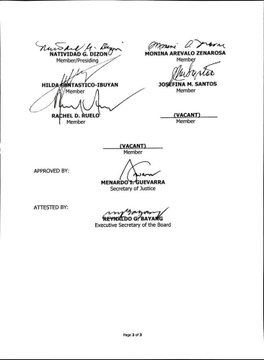
The Department of Justice has approved simpler rules and faster processing of requests for parole and executive clemency as authorities rush to decongest jails amid the COVID-19 pandemic.
The agency announced Wednesday that Secretary Menardo Gueverra has approved a resolution from the Board of Pardons and Parole that will simplify the process for the early release of prisoners.
In a statement, DOJ said the order removes most of the paperwork required for Persons deprived of liberty or PDLs seeking parole and executive clemency.
The board can grant parole or early release to an inmate who has served the minimum period of his sentence. Meanwhile, only the President can grant executive clemency, which involves the reduction of jail time or the removal of a person's criminal liability.
Prisoners aged 65 or older can also avail of the easier parole process, provided that they have served at least five years of their sentence. Those with serious medical ailments that will be able to prove that their continued imprisonment will worsen their condition may also avail of parole, but would need certification from a designated doctor from the Department of Health or the Malacañang clinic director.
"The resolution excludes from its coverage PDLs convicted of heinous crimes or in cases involving illegal drugs, or those classified as high risk by the Bureau of Corrections," the DOJ said.
Detainees only need to submit Court Certifications of No Pending Case and No Pending Appeal and show their records under the National Bureau of Investigation for their request to be processed.
The same resolution also doubled the case load of the board to accommodate more petitions for review just to fast-track the approval process. In light of strict stay-at-home protocols under the enhanced community quarantine, those who have walked free will not be required to physically report to parole and probation officers while the Philippines is under a state of national emergency due to the coronavirus pandemic.
The Quezon City Jail and the Correctional Institution for Women have reported COVID-19 outbreaks within their wards. A petition for the early release of prisoners deemed highly vulnerable to the disease is pending before the Supreme Court, as human rights groups deem detention cells as "ticking time bombs" for infections.








No comments:
Post a Comment